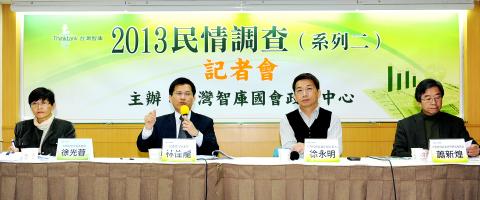More than 60 percent of respondents said they would vote in a proposed national referendum on the Fourth Nuclear Power Plant in New Taipei City’s (新北市) Gongliao District (貢寮) and almost 70 percent of those polled supported the suspension of construction and operations at the controversial power plant, a survey released yesterday showed.
The survey, conducted by Taiwan Thinktank from Feb. 2 until Monday, found that a majority of the respondents favored the anti-nuclear cause and stood on the opposite side to the government, which supports completing construction of the power plant.
When asked if they would vote in the referendum, 63.4 percent said they would vote and 18.7 percent said if they would if they could. If the referendum failed, 74.1 percent of those polled said the government should still suspend construction of the plant.

Photo: Chang Chia-ming, Taipei Times
Almost 70 percent of respondents said they would vote “yes” in the Chinese Nationalist Party (KMT)-proposed referendum, which would ask voters if construction and operations of the power plant should be suspended, with 16.6 percent saying they would vote “no” and 13.9 percent undecided.
Respondents were also suspicious of the government and state-owned Taiwan Power Co (Taipower, 台電), with 84.3 percent saying the government had not provided the public with sufficient information on nuclear energy and 66.5 percent saying that Taipower and the Atomic Energy Council were no longer credible sources of information.
The poll also found that more than 80 percent were concerned that a nuclear disaster could happen in Taiwan and 72.7 percent of those polled said they supported the nationwide anti-nuclear demonstration held on Saturday that attracted an estimated 200,000 participants.
People’s concerns about nuclear safety were so strong that 71.6 percent said they would still oppose completing the construction of the plant even if electricity prices would have to increase by 10 percent as the government has claimed.
Asked about the Referendum Act (公民投票法), 63.2 percent said the current threshold is unreasonably high and 63 percent said they would apply for absentee voting if the mechanism is adopted in the referendum.
Meanwhile, respondents also said they were unfamiliar with and lacked confidence in Premier Jiang Yi-huah (江宜樺), who was inaugurated last month, with 40.3 percent saying that Jiang would not be able to turn the economy around and 51.6 percent saying that they were not confident about the Premier’s pension reform plans.
Jiang’s approval rating was 23.7 percent, with a disapproval rating of 38.3 percent, while 38 percent said they had no opinion.
When asked about who they would support as the KMT’s presidential candidate in 2016, 36.2 percent favored New Taipei City Mayor Eric Chu (朱立倫) and 29 percent said they had no opinion.
Legislative Speaker Wang Jin-pyng (王金平) ranked second with 13.6 percent support, while Taichung Mayor Jason Hu (胡志強) was third with 8.7 percent.
Jiang garnered just 1.7 percent, behind Taipei Mayor Hau Lung-bin’s (郝龍斌) 6.2 percent and Vice President Wu Den-yih’s (吳敦義) 4.6 percent.
The survey collected 1,074 valid samples with a margin of error of 3 percentage points.

DAREDEVIL: Honnold said it had always been a dream of his to climb Taipei 101, while a Netflix producer said the skyscraper was ‘a real icon of this country’ US climber Alex Honnold yesterday took on Taiwan’s tallest building, becoming the first person to scale Taipei 101 without a rope, harness or safety net. Hundreds of spectators gathered at the base of the 101-story skyscraper to watch Honnold, 40, embark on his daredevil feat, which was also broadcast live on Netflix. Dressed in a red T-shirt and yellow custom-made climbing shoes, Honnold swiftly moved up the southeast face of the glass and steel building. At one point, he stepped onto a platform midway up to wave down at fans and onlookers who were taking photos. People watching from inside

A Vietnamese migrant worker yesterday won NT$12 million (US$379,627) on a Lunar New Year scratch card in Kaohsiung as part of Taiwan Lottery Co’s (台灣彩券) “NT$12 Million Grand Fortune” (1200萬大吉利) game. The man was the first top-prize winner of the new game launched on Jan. 6 to mark the Lunar New Year. Three Vietnamese migrant workers visited a Taiwan Lottery shop on Xinyue Street in Kaohsiung’s Gangshan District (崗山), a store representative said. The player bought multiple tickets and, after winning nothing, held the final lottery ticket in one hand and rubbed the store’s statue of the Maitreya Buddha’s belly with the other,

‘NATO-PLUS’: ‘Our strategic partners in the Indo-Pacific are facing increasing aggression by the Chinese Communist Party,’ US Representative Rob Wittman said The US House of Representatives on Monday released its version of the Consolidated Appropriations Act, which includes US$1.15 billion to support security cooperation with Taiwan. The omnibus act, covering US$1.2 trillion of spending, allocates US$1 billion for the Taiwan Security Cooperation Initiative, as well as US$150 million for the replacement of defense articles and reimbursement of defense services provided to Taiwan. The fund allocations were based on the US National Defense Authorization Act for fiscal 2026 that was passed by the US Congress last month and authorized up to US$1 billion to the US Defense Security Cooperation Agency in support of the

‘COMMITTED TO DETERRENCE’: Washington would stand by its allies, but it can only help as much as countries help themselves, Raymond Greene said The US is committed to deterrence in the first island chain, but it should not bear the burden alone, as “freedom is not free,” American Institute in Taiwan Director Raymond Greene said in a speech at the Institute for National Defense and Security Research’s “Strengthening Resilience: Defense as the Engine of Development” seminar in Taipei yesterday. In the speech, titled “Investing Together and a Secure and Prosperous Future,” Greene highlighted the contributions of US President Donald Trump’s administration to Taiwan’s defense efforts, including the establishment of supply chains for drones and autonomous systems, offers of security assistance and the expansion of